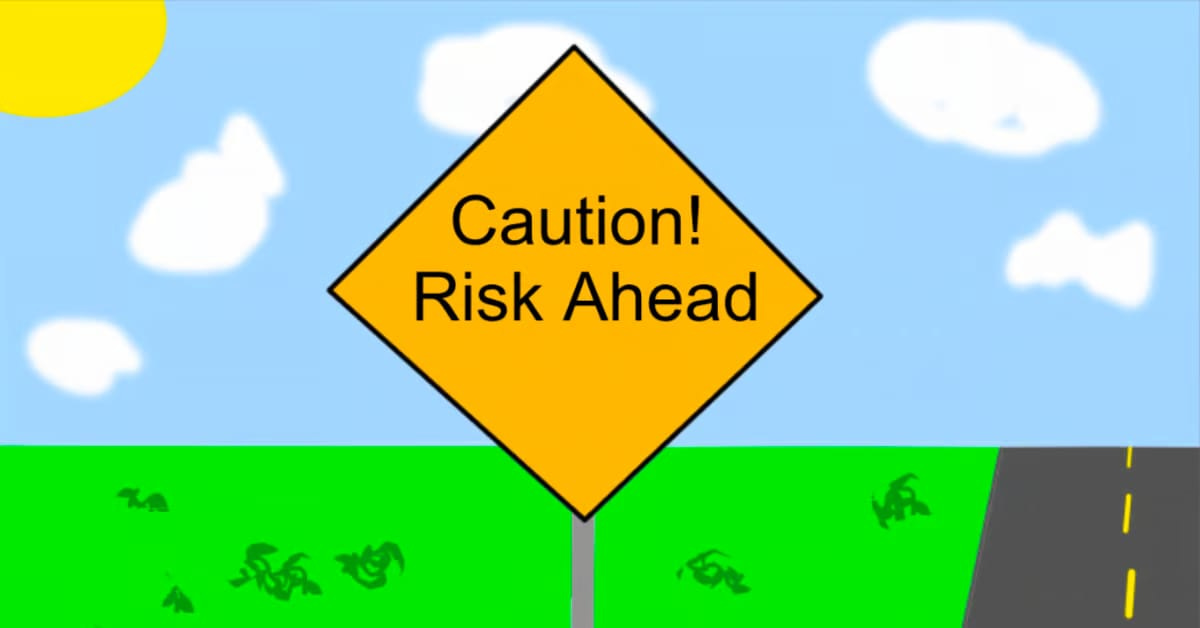Rethinking Risk.
Risk isn’t a measure of negative consequences. It’s a measure of uncertainty.
Welcome to Young Money! If you’re new here, you can join the tens of thousands of subscribers receiving my essays each week by adding your email below.
“Risk” has such a negative connotation. Take the phrase “high-risk behaviors,” for example. What comes to mind? Recreational drug use, drinking and driving, unprotected sex with strangers, and anything else that you were warned away from by a D.A.R.E. officer in the 5th grade. The Oxford Dictionary goes so far as to define the word “risky” as “involving the possibility of injury, loss, or other adverse or unwelcome circumstance; dangerous; hazardous.”
Risk also has an active connotation, meaning that we only think of the risks associated with actions that we take. Would investing in Reddit’s stock be a risky investment? Is quitting my job to start my own company a risky endeavor? What about moving to New York? London? San Francisco? Asking a girl out? Ending a relationship? All of these possible “risks” have consequences.
Because we view “risk” as a barometer for negative consequences that could stem from our actions, many of us seek to eliminate, or, at the very least, minimize risk in our lives. Every choice that we make should limit consequences and preserve optionality. We dip our toes in relationships without committing, to avoid leaving ourselves vulnerable. We make career choices that maximize exit opportunities over enjoyment, and we care far more about protecting what we could lose than pursuing what we could gain.
These ideas of risk aren’t wrong, per se, but they are incomplete. Risk doesn’t simply increase the likelihood of unpleasant outcomes; risk is just a lack of guaranteed outcomes. Take investing, for example. Stocks are considered risk assets not because they’re likely to go down, but because their year-to-year returns are uncertain. Similarly, government bonds are not considered low-risk assets because they guarantee extraordinary returns, but simply because they do guarantee a return, which could be quite marginal. And, yes, investing in stocks will indeed expose you to the possibility of losses, but choosing not to invest in stocks, over time, guarantees subpar returns.
Risk isn’t a measure of negative consequences. It’s a measure of uncertainty. And the issue with minimizing risk is that while we protect our downside, we prevent ourselves from achieving any sort of meaningful upside. In this way, risk minimization isn’t an insurance policy as much as it is a collar, and the cost of protecting our downside is the loss of any meaningful upside.
Really, risk is synonymous with vulnerability, and vulnerability is a necessary component in the pursuit of anything meaningful. It’s true in investments, relationships, careers, skill mastery, anything. If you sell a stock on a 10% pop, you miss the potential for it to increase 10,000%. If you refuse to open up your heart to someone, you’ll pivot from situationship to situationship. If you never double down on one professional path or another, you’ll be a lifelong generalist with capped upside. Sacrificing a higher salary for meaningful equity could create life-changing wealth if your company does well. Publishing your thoughts on the web is terrifying, but it might lead to an opportunity that could change your life.
In the short-run, all of the choices that we make carry some risk of failure, but in the long-run, the costs of all of the choices that we don’t make accumulate, far outweighing any mistakes that we would have experienced along the way.
The key, then, isn’t avoiding risks. It’s figuring out which risks are worth taking.
- Jack
I appreciate reader feedback, so if you enjoyed today’s piece, let me know with a like or comment at the bottom of this page!
Young Money is now an ad-free, reader-supported publication. This structure has created a better experience for both the reader and the writer, and it allows me to focus on producing good work instead of managing ad placements. In addition to helping support my newsletter, paid subscribers get access to additional content, including Q&As, book reviews, and more. If you’re a long-time reader who would like to further support Young Money, you can do so by clicking below. Thanks!
Jack's Picks
This NY Mag piece on podcasting extraordinaire Andrew Huberman’s love life was, in my opinion, a fascinating read.
I spent 30 minutes reading this long, but important, piece on the history of Adderall and its abuse in our country.
Super cool interview between Y Combinator’s Garry Tan and PR legend Lulu Cheng Meservey on how startup founders can leverage social media movements.


